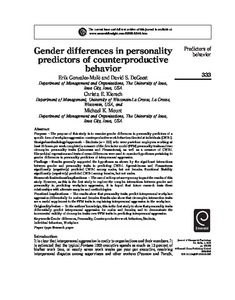Gender differences in personality predictors of counterproductive behavior

Gonzalez-Mulé, Erik ; DeGeest, David S. ; Kiersch, Christa E. ; Mount, Michael K.
Journal of Managerial Psychology
2013
28
4
333-353
bullying at work ; gender ; survey
Psychosocial risks
http://dx.doi.org/10.1108/JMP-12-2012-0397
English
Bibliogr.
"Purpose – The purpose of this study is to examine gender differences in personality predictors of a specific form of workplace aggression: counterproductive work behaviors directed at individuals (CWB-I).
Design/methodology/approach – Students (n ¼ 212) who were part-time employees working at least 15 hours per week completed a measure of the five-factor model (FFM) personality traits and two circumplex personality traits (Calmnesss and Pleasantness), as well as a measure of CWB-I.
Hierarchical regressions and tests of mean differences were used to examine hypotheses pertaining to gender differences in personality predictors of interpersonal aggression.
Findings – Results generally supported the hypotheses as shown by the significant interactions between gender and personality traits in predicting CWB-I. Agreeableness and Pleasantness significantly (negatively) predicted CWB-I among males, but not females. Emotional Stability significantly (negatively) predicted CWB-I among females, but not males.
Research limitations/implications – The use of self-report surveys may impact the results of this study. However, as this is the first study to explore the complex interactions between gender and personality in predicting workplace aggression, it is hoped that future research tests these relationships with alternate samples and methodologies.
Practical implications – The results show that personality traits predict interpersonal workplace aggression differentially for males and females. Results also show that circumplex intersection traits are a useful supplement to the FFM traits in explaining interpersonal aggression in the workplace.
Originality/value – To the authors' knowledge, this is the first study to show that personality traits
differentially predict interpersonal aggression for males and females; and to demonstrate the
incremental validity of circumplex traits over FFM traits in predicting interpersonal aggression."
Digital
The ETUI is co-funded by the European Union. Views and opinions expressed are however those of the author(s) only and do not necessarily reflect those of the European Union or the ETUI.